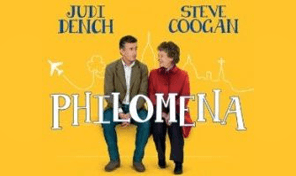Philomena
Kadijha reviews Philomena directed by Stephen Frears, starring Judi Dench and Steve Coogan.
Cert: 12
Runtime: 98 mins
Director: Stephen Frears
Cast: Judi Dench, Steve Coogan, Sophie Kennedy Clark, Simone Lahbib, Charlie Murphy
Rating: ****
Martin Sixsmith may have been publicly fired from 10 Downing Street in 2004, yet after listening to the painful secret of an Irish woman named Philomena Lee, the journalist became a hero when she granted him permission to write her story. At 19 years old, her 3 year old boy had been sold by Roman Catholic nuns. Since publishing The Lost Child of Philomena Lee in 2009, a generation of Irish women have broken their silence surrounding the Magdalene Sisters who severed ties between them and their children. Till this day, restless people are still searching for their relatives. What becomes of Philomena's little Anthony is a shockingly bittersweet story, thereby making Philomena the must see film of the year. Steve Coogan and Jeff Pope were loyal to Sixsmith's book in their script, and as a result, they won the award for Best Screenplay at the 70th Venice International Film Festival.

Sophie Kennedy Clark plays the young Philomena in 1951, whose happiness at a carnival branded her as a 'fallen woman' for the nuns of Sean Ross Abbey to torment. Throughout the 1950s and 1960s, it was considered necessary for nuns to incarcerate girls who had fallen pregnant out of wedlock. They were forced into hard labour, and the mother superior had no intention of nursing them with painkillers after they gave birth. For those mothers who survived, precious time spent with their children in the nursery was limited to an hour per day. During a visit to Sean Ross Abbey, Sixsmith is unable to find any photographs of maternal pleasures, such as Anthony chortling when Philomena repeatedly kisses his face. This tender scene is what provides respite for the cinema audience. But according to the photographs, the nuns tended to the children. In their opinion, this was not a tool for propaganda because they were grieving for lost innocence, lost souls, whilst raising new ones into a righteous world.

Taking care not to paint the nuns as evil caricatures, Philomena unfolds into an open minded film where even friendly nuns such as Sister Annunciata, are remembered by the real Philomena who was grateful for her support whilst she gave birth to a breech baby. However, amongst those photographs is a disturbing contrast to the virginal Sisters: a signed headshot of the Hollywood actress, Jane Russell. Her picture is the iconography of materialism in the Roman Catholic Sisterhood, as a countless number of rich Americans adopted Irish children without the consent of their mothers.
Judi Dench's Irish relatives told her how their community were oblivious to the selling of babies. What's more, the real Martin Sixsmith's investigation exposed how the church was a privatised and charitable institution without any control of the government: the state was even kept in the dark. The External Relations minister first read the headline saying, '1,000 CHILDREN DISAPPEAR FROM IRELAND,' on the front page of an amateur West German newspaper. This fatal embarrassment, also pronounced how easy it was for Jane Russell to acquire a passport for a child at the Irish legation office, with no questions asked. History is captured by Frears in just one photo frame, and this is where the politics ends in the film.

Had the production team further criticised the government, then a preaching, political debate may have spoken over Philomena's voice. Dench portrays 'Phil' as a blunt speaking spirit, who never asked to be caught up in the politics versus religious values of Irish history. Her quirky attitude gets underneath Sixsmith's skin, as Coogan conveys the journalist as an insightful Atheist who stops himself from laughing at her dead pan honesty; Phil doesn't know how funny she is.
Written by Kadijha Kamara
(Philomena is available to buy on DVD and Blu-Ray)






